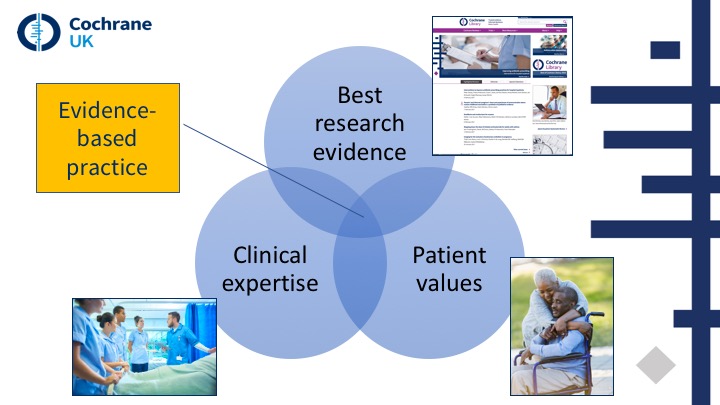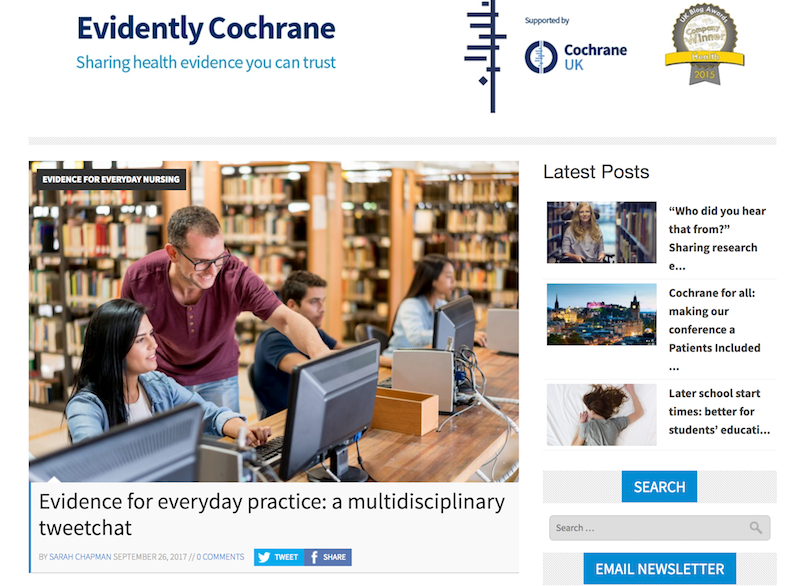
If you haven't joined in a tweet chat before it's very simple. Here's a guide Tweet
Chat Details
Hosted by WeNurses using #WeMDT
This chat is guest hosted by @SarahChapman30 @CochraneUK
"Evidence based practice" is a phrase we hear often in healthcare but actually putting evidence into practice can be challenging. For starters you don't know what you don't know, finding the evidence that is relevant to your practice can be as haphazard as stumbling across it on the internet or in a journal. There is also the minefield of reliable evidence: can you trust the source? have you critically appraised it? is the evidence valid for your area of work? Finally once you have found and appraised the evidence the challenge then is to discuss this with your peers and your patients and actually put what you have learned into practice.
This #WeMDT discussion is being held in conjunction with Cochrane UK and aims to explore evidence for everyday - how we find it, how we use it and how it impacts our practice. Sarah Chapman (@SarahChapman30) from Cochrane UK writes:
"At CochraneUK ( @CochraneUK ) we use social media to share evidence, most often from Cochrane reviews, in different formats and different levels of complexity, with the aim of making it accessible and useful to people making health decisions. We do this through blogs on http://www.evidentlycochrane.net, blogshots and other products across several social media platforms, and through tweetchats, most often with the wonderful WeCommunities!
Using the best available evidence to inform decisions is an essential part of evidence-based practice, along with clinical expertise and the patient’s preferences and values.
We have four ‘Evidence for Everyday’ series, created for specific audiences:
- Nurses #EENursing - VIEW HERE
- Midwives #EEMidwifery - VIEW HERE
- Allied health professionals #EEAHP - VIEW HERE
- Patients/others making health choices #EEHealthChoices - VIEW HERE
We called the series ‘Evidence for Everyday’ because we tend to focus on common topics and practices, but also because we think everyday practice should aim to be evidence-based.
When reliable evidence just isn’t there, perhaps we should think of it as ‘evidence-aware practice’! Being aware of gaps in the evidence is really important. There are many examples of clinical practice where something is done routinely, but for which the benefits and harms, and other factors, have not been established by reliable evidence. I’ve written more about that HERE
One of the things we most value being able to do, is to invite practitioners and patients to bring their experience and expertise alongside the evidence, in blogs and in tweetchats. We also host Students 4 Best Evidence @Students4BE where you can find useful resources like this library of evidence-based nursing resources, and read and reflect on blogs – or write them!
Social media is a great way to share (and find) evidence for practice as it reaches so many people. Recently we used social media to share a newly updated Cochrane review, with high quality evidence, informing and supporting the recommendation in UK and international guidelines that peripheral venous catheters (PVCs) should be replaced only when clinically indicated rather than routinely - you can read about the impact of this HERE, but essentially we used a variety of social media approaches to bring relevant everyday evidence to healthcare practitioners.
We’re always looking to improve what we do too, and if we can better understand what helps and hinders you in making your practice evidence-based, that will help us to make the series more useful to you."
Questions we will be exploring during this tweetchat:
- What was the last piece of evidence you used to inform your practice?
- How easy is it to find and understand up-to-date evidence?
- What are the barriers to making your practice evidence-based?
- What helps / could help you to bring more evidence into practice?
- What could help to bring evidence into practice as part of decision-making with patients and colleagues?
- What one piece of evidence do you feel would help with your daily practice?
Chat Contributers
 100 Tweets
100 Tweets
200 Tweets
20000 Impressions
20000 Impressions
20000 Impressions
Engagement Wheel
Chat Word Cloud
Participant bio cloud
Evidence Based Practice
Chat Summary
To read Sarah Chapman's (Cochrane UK) fab summary of this conversation please CLICK HERE
Do I use evidence in my practice ? This is a question that I have found I have asked myself more and more of late - with the new NMC Code of Conduct and the implementation of revalidation I have found myself questioning my practice and wondering if evidence is something we merely pay lip service to or do we actually embed it into everything that we do. I think that being a part of an social media nursing community has really helped me to not only know what I don't know regarding evidence but also it gives me the confidence to speak out and share evidence and research and to make changes in practice. So when this Twitter discussion kicked off by asking about the last piece of evidence that participants had used, i felt confident to answer:
It was great to that others felt confident enough to share too:
The next question focussed on how easy it is to find and understand up-to-date evidence and I have to admit that this is something i have struggled with in the past. Finding evidence can be tricky: Firstly you don't know what you don't know .. so you don't know what you are looking for. Secondly, when you know what you are looking for there is often a plethora of information, some useless, some not, some relevant, some not and some reliable and some not, navigating this is hard. Thirdly, and finally, once you find that one piece of vital evidence it can often be written in "academic" language and a real trial to read and digest. It was really interesting to to see how other overcome these challenges with evidence:
Question 3 focussed on the barriers to implementing evidence in our practice, something I have personally had trouble with of late, often it's the people we work with who can be the biggest barrier, but i was interested to hear other peoples thoughts:
As the discussion moved on it turned to what could help us to bring more evidence into practice - again this is something I have reflected on lately and not really come to any firm conclusions so it was fascinating to read other peoples tweets on the matter:
I was really interested to read about visual abstracts and this is something that is worth exploring further - it seems to me this is another avenue to disseminating research in practice, something that can be used in journal clubs, in emails, facebook groups, twitter ... the list goes on!
Towards the end of the discussion people were encouraged to share what one piece of evidence would help them in their day to day practie - there were some great answers and some of these are definitely on my wish list too:
Thank you to all who took part in the discussion - finding, understanding and brining evidence into practice is something that should be on the forefront of every practitioners mind. It's a challenge but I certainly feel that it is made easier with the advent of social media, a better connected world enables us to share what is new, discuss what is new and supports us to implement what is new. Everyday evidence is perhaps something that is not just something we use in our everyday practice but perhaps a mantra for how often we should think about the evidence behind our practice.
Particular thanks goes to the lovely Sarah Chapman from Cochrane UK for developing this discussion and being a fabulous guest host.
Post Chat Comments
You'll need to be logged into via Twitter from the main menu, then you can share your post chat comments...
|
@{{Comment.screenName}}
{{Comment.DateCreated | date:"dd MMMM yyyy HH:mm"}}
|
{{Comment.Comment}} |





